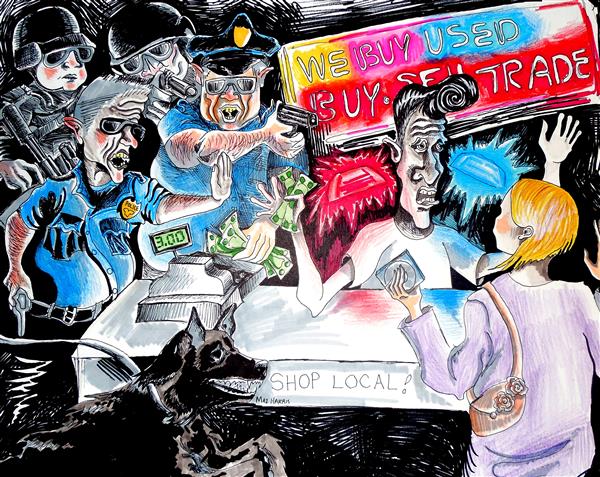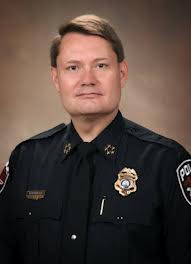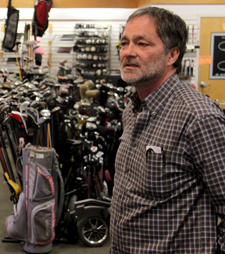
Illustration by Mai Harris
A new measure currently before the Murfreesboro City Council aims to fight the buying and selling of stolen merchandise, but many local retailers and consumers are crying foul, saying it not only places an unnecessary financial burden on certain small businesses, but additionally is a serious invasion of privacy and a violation of law-abiding citizens’ personal rights.
The item up for debate involves proposed revisions to the existing Murfreesboro City Code with “respect to Pawnbrokers and Secondhand Dealers”; revisions that would, in all actuality, make it more difficult and time consuming to sell a used CD or bag of golf clubs in Murfreesboro than to buy marijuana in Denver.
If passed, the new language would require certain shops that buy and sell used merchandise to not only keep far more detailed records of their transactions involving certain items, but to photograph the seller, enter the data into a national database, purchase a license each year, adhere to holding time periods and allow Murfreesboro Police officers access at any time to business records.
“This is very serious because of the rights involved of ordinary people, not criminals. I think that is not a good thing,” said Mike Morrison, owner of Digital Planet on Robert Rose Drive. “I hope the whole idea is struck down. . . . Hopefully they will realize this is wrong.”
Many local merchants argue the measure is more about money, surveillance and control than stopping real crime.
“This request is far more expansive than a lot of similar police requests,” Morrison said. “If they do this, they would have turned my business over to the police . . . and it will get worse. The police want total control.
“This is not the way to go about it.”
Across town at Media Rerun, store owner Larry Pinkerton said he and his employees make a special effort as it is to avoid purchasing stolen property and to work with local law enforcement to prevent crime.
“We’ve had several store meetings to discuss common-sense ways to avoid stolen property. We’ve alerted police of suspicious activity. We have other methods to discourage those we find suspect from trying to sell to us. We have also asked law enforcement’s advice in dealing with suspicious customers or activity.” Pinkerton said. “As I recall, in our 11 years you can count on one hand the number of times law enforcement has requested any information. There have been very few times law enforcement has questioned us about a purchase we made.”
Play it Again Sports owner Oliver Tribble said he respects the work the local police do, and he very much desires for Murfreesboro to be a nice, crime-free community, but that the proposal simply steps over the line and prohibits a retailer’s freedom to do business.
“I’m not mad at the police, but there’s a middle point. I realize they are trying to do good. They really are,” Tribble said. “But would we be a little safer if everyone driving a car wore a crash helmet? Why don’t we make everyone do it? It’d save lives! But there has to be a line.”
Tribble acknowledged that city officials have done a good job of shaving down the scope of the code over the past months.
“The original draft cast a very big net,” City Attorney Adam Tucker said. “The holding period for items not containing precious metals is 7 days; we received some comments on that.”
But after a round of revision, the proposed Code now contains numerous exempted items, merchandise that would not need to be tracked.
“It exempts a whole host of categories: comic books, magazines, coins,” Tucker listed. “In addition, we exempted charitable organizations, flea markets, auctioneers, garage sales . . .”
Many sporting goods are now exempt from the proposal, focusing on bigger-ticket items.
“They’ve done a good job about getting it down. It got down to golf clubs and bikes for me,” Tribble said from his sporting goods store, but still he said he has serious philosophical and financial reservations about it.

“I really do appreciate you allowing me to only document golf clubs and bicycles, which would save me a tremendous amount of time and money,” Tribble said in a letter to MPD Det. Kerry Thorpe, but continued that, even with the revisions, “I’ve calculated the additional labor costs and offsite storage costs in this area [which] will run me approximately $1,150 per month, just shy of $14,000 per year.”
Digital Planet and Media Rerun both confirmed it would cost their businesses thousands of dollars annually as well, and “would not only be burdensome and awkward to us but also to our overwhelmingly honest customers,” Pinkerton said.
“This won’t put me out of business, but it will take a lot from local charities,” Tribble said.
Tribble has donated thousands to charities and youth sports organizations over the years; the funds required to be in compliance with new regulations would have nowhere else to come than from the portion of his proceeds he sets aside to donate, he said.
“If the town is going to take this money from me . . . I’ve given all I can,” he said.
Taking money from charities: one of the unintended consequences of over-legislation.
In addition to the added costs of the license, the extra hired help and the additional storage space required to be in compliance with the rewording, Tribble cites “the fact that my customers would feel as if they are being treated as suspected criminals while attempting to obtain value for the good [merchandise] their families no longer use. The customer service nightmare alone will be enough to keep customers from shopping in my store.
“They want us to ask weight. I don’t want to ask my customers their weight. I don’t want to [write] down someone’s race,” Tribble said.
“It looks like a 1980s program, with the black and green screen,” he continued.
Plus, with so many exemptions in the law’s wording, “Now, they’re picking and choosing winners,” Digital Planet’s Morrison said. Why should his business be targeted, while, for example, a clothing or antique dealer is not? “So the police can have their new toy,” he said.
The new toy he is referring to is access to an online database calls LeadsOnline, a third-party, for-profit system that tracks secondhand purchases across the country, and encourages detectives to not “give up on getting home in time for dinner,” by assisting them in their theft investigations by granting them access to data on used merchandise transactions across the country, in exchange for a fee from their (taxpayer-funded) law enforcement agency.
“LeadsOnline is the nation’s largest online investigation system for law enforcement, providing rapid electronic access to transactions from thousands of reporting businesses,” according to leadsonline.com.
Murfreesboro Chief of Police Glenn Chrisman says merchants feeding data from every purchase they make into the system will help return stolen property to theft victims and to prosecute criminals of larceny and burglary charges.
“Hastings is already doing this; not only in Murfreesboro, but all over the nation,” Chrisman said before introducing a sales video for the LeadsOnline program at the Dec. 5 Murfreesboro City Council meeting. “We support our small businesses, but we need their help.”
He said since secondhand shops are profiting from the sale of used merchandise, they should share some of the administrative work of entering information from each transaction into a large national database as part of their effort to help fight crime.
“Larceny and burglary are the most frequent crimes committed in Murfreesboro,” Chrisman said.
It is not his intention to pick on the small business people, but rather to “level that playing field” between them and pawnbrokers,” and “bring the language current with the state’s regulation of pawnbrokers.”

Chief of Police Glenn Chrisman
“Pawnshops are already heavily regulated by state statute,” Chrisman said. “But we began to see some problems with the secondhand businesses.”
Despite a vague assumed correlation between used CDs and gang violence and a LeadsOnline infomercial making its way into the Council Chambers, the City Council was having none of it at the code’s first reading.
Council member Doug Young, who owns City Tile, seems to understand the hectic nature of being on the sales floor.
“If I’m a small business owner, at my sales counter, and I have to take 5 to 10 minutes . . . is there some way we can improve that?” Young asked Chief Chrisman. Young called himself a “terrible typist,” stating the time it would take to enter the sale information into a computer database is “a big deal to the small businessman.”
“I respectfully ask we defer this,” Young said immediately upon hearing Chrisman’s presentation.
Though other council members had more questions and comments on the measure; Shane McFarland inquired about whether the revisions would include CDs and video games. Would data collection be required from “9- or 10-year-old kids with their video games,” McFarland asked. “. . . they don’t have IDs.”
He also pointed out some local dealers do not have computers.
Mayor Tommy Bragg raised the point that the measure would require many businesses to get an additional permit, in addition to the business license are already required to obtain.
If a criminal has a stolen item, and can’t sell it at a local retailer, “What’s to stop them from them selling that on eBay?” Eddie Smotherman asked.
Nothing, Tribble deferred.
“It is against small business,” Tribble continued about the measure and said the over-regulation would place Murfreesboro brick-and-mortar businesses at a competitive disadvantage to listings items on websites like Amazon, eBay and Craigslist, which would not have to collect the data or adhere to holding periods.

Oliver Tribble at his Play It Again Sports store
As an alternative to overhauling the secondhand dealer code, Tribble proposes a local “Merchants Watch” program. Under this program, the Murfreesboro Police would provide secondhand dealers with a list of stolen property each morning, rather than have shopkeepers compile date from every transaction they make.
Business owners could quickly peruse that list each day for items that may come in their shop, and alert their sales clerks to be on the lookout for recently stolen items.
Tribble said seeing a digital camera on the list would not affect Play it Again sports, but if an individual reported a stolen bicycle to the Murfreesboro Police, and that made its way on a daily stolen property list e-mailed to all secondhand dealers, Tribble said he could let his employees know of that theft the morning after it occurred, and potentially intercept the bicycle.
Supporters of this idea say the administrative work to make this procedure happen could easily be done, compared to the huge change and data collection the chief of police proposes.
“As a routine part of our day we begin our business every morning with a review of (the previous day’s) property crimes, particularly burglaries,” Chrisman said.
Media Rerun operators said they would like to see the Merchants Watch concept be given a shot.
“There is no guarantee that the added cost and burden of implementing LeadsOnline, that is, shifting the police work and cost to retailers, will justify the ordinance,” Pinkerton said. “We do support the Merchants Watch. It proposes that retailers and law enforcement partner, via a list of stolen property provided to retailers by law enforcement. This could help in intercepting items before being purchased by a retailer. Recent crime statistics show that Murfreesboro averages only 4 burglaries per day. Sending bulk e-mails with a list of reported stolen items should not be a hardship for law enforcement and not add cost to dealers.”
After all, the police department is the big operation, with the $25 million budget and lots of staff.
“There seems to be this misperception that we (independent retailers) are all millionaires,” Tribble said. “We don’t have a bunch of secretaries.”
Another potential unintended consequence of the code revision: “As with most legislation, it targets the poor,” Morrison said.
How?
If a middle-class individual wants to sell something, and finds out they have to be ID’d, photographed and possibly questioned about their weight and race, “They can walk out; they can give the item to a neighbor or sell it in a yard sale,” Morrison said. “I’ve bought CDs and movies from young mothers so they could have money for diapers and milk. If someone like that has to have money immediately, and can sell some items to get it, why subject them to the humility of being photographed? Where is the dignity?”
He says, regardless if the new language is approved, he is done dealing in the secondhand market.
“I am out,” he said, “no matter what,” referring to the used element of Digital Planet’s business (but confirming the store will continue to sell new merchandise). “Most of the customers are angry. They feel like their personal rights (would be) violated.”
Antiques dealer Randy Smotherman also said he would choose to cease buying used merchandise affected by the measure from the public if it passes the City Council’s vote and becomes the law of the land.
So, as it stands, the legislation was deferred upon on its first reading at that Dec. 5 meeting, and its future is uncertain pending more investigative review and input from the people of Murfreesboro. Visit murfreesborotn.gov for contact information for the mayor and City Council people, and let your elected officials know what you feel about the business before your city. View the full text of the proposed ordinance here.













